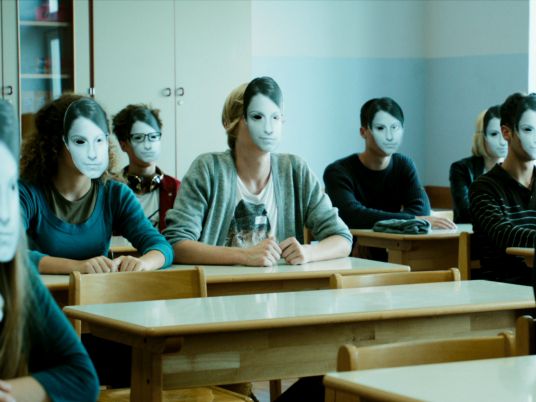One of the films shown as part of the Panorama of the European Film, currently held in Cairo, is renowned British film "This Is England," which tells the story of a young boy growing up in a changing country.
For his fifth feature film, acclaimed British director Shane Meadows revisits his childhood to tell the story of twelve-year-old Shaun (Thomas Turgoose) who has lost his father in the Falklands War. Picked-on and lonely, Shaun spends his time wandering around the gloomy seaside town he lives in, riding his bike through empty lots and walking along the shore of a deserted beach. After getting into a fight at school, Shaun runs across a group of older, non-threatening skinheads who console and sympathize with him. Gradually, Shaun gains acceptance into their brotherhood; they shave his head, and supply him with a shirt and braces to go with his new black boots. Finding in this gang the friends he so desperately desired and, in the case of Woody (Joe Gilgun), the group’s charismatic leader, the father figure he recently lost, Shaun is able to rebuild his confidence as together they roam through fields and vandalize abandoned apartments. However, things change with the arrival of Combo (Stephen Graham), a skinhead recently released from prison.
As its title implies, "This is England" is as much a coming-of-age story for Shaun as it is for his country, which was undergoing a national identity crisis of sorts following the Falklands conflict. The aftermath of the war saw bubbles of resentment and racism swelling across working-class England, a sentiment not expressed by the anti-establishment skinheads led by Woody, but terrifyingly personified by Combo and his cronies.
Meadows has written an excellent script: simple, realistic, yet endlessly revealing of its characters’ inner workings as well as the state of a nation, and it is to his credit that none of the characters are reduced to stereotypes. He also wisely avoids too much melodrama–the script has several humorous moments but manages to stay level against the emotional highs and lows of the storyline. Shaun’s reluctance to talk about his deceased father, and the happiness he expresses when Woody and the other skinheads treat him kindly, are conveyed with a lack of sentimentality that makes these scenes all the more moving.
It’s not surprising that Meadows based much of the film on his own childhood experience as a member of a skinhead group–the attention to detail is consistently strong, down to individual mannerisms and slang. The characters feel very real, scarily so at times, and it’s clear they are recreations of people Meadows knows and understands very well. He is also aided by a uniformly strong cast. As Woody, JoeGilgun creates a character that is understandably appealing to young Shaun: a mixture of youthful enthusiasm and a strong sense of responsibility and moral conduct. Stephen Grant, on the other hand, portrays Combo with a deep sense of confusion and hidden trauma in a thoroughly unnerving performance. Jittery and spitting with rage, Combo may carry a machete, but he’s just as terrifying without it. Grant delivers his lines with such electrifying intensity, it’s no wonder the young Shaun is seduced by Combo into abandoning the less abrasive Woody.
However, the real standout is newcomer Turgoose, just 13 at the time of filming. Although inexperienced, Turgoose gives a performance that is startlingly complex and devastatingly effective. The look in his eyes as he takes in Combo’s hate-fuelled rants and the subtle changes in his facial expressions as he makes the choices he believes will best honor the memory of his father, are heartrending. Throughout, Meadows and Turgoose are careful not to portray Shaun as a monster , even when he’s led by Combo into committing racist acts. In the end, he’s just a confused child in search of a father-figure.
By Meadows’ own admission, "This Is England" has many autobiographical elements to it and smart soundtrack selections accompanied by an overall grainy home-video look, courtesy of cinematographer GonzaloFernández Berridi, lend a lot to the authenticity of the film. The sparse piano-led score is also effective, especially in combination with the imagery of the relentlessly depressing town in which the story takes place.
Overall, the film is a towering achievement despite its unassuming nature. Not many filmmakers can make a personal, rites-of-passage story that is also a study of a nation undergoing significant change and a thought-provoking look at the origins of many of the problems it faces today, but Meadows pulls off all of the above brilliantly.



